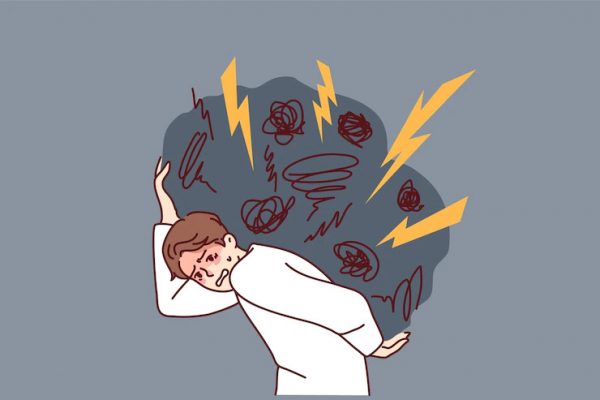In the psychology field, emotional instability is an “abnormal tendency to experience intense feelings.” Being emotionally unstable can manifest in many ways. An emotionally unstable person may be characterized by heightened and unpredictable mood swings, frequent anger or irritability, and outbursts of crying and depression.
Emotional instability is a mental health condition in which a person experiences severe and frequent bouts of depression, mania, or both. The episodes are marked by intense emotional states that vary dramatically from person to person.
While some experience intense periods of happiness followed by feelings of despair and hopelessness, others may swing from feelings of euphoria to feelings of deep sadness and worthlessness.
In this article, I will briefly discuss 10 signs of emotional instability.
1. Impulsivity
Impulsivity is a behaviour or thought pattern characterized by a rush to act or speak based on current feelings rather than logical reasoning. The trait of impulsivity involves acting on a whim, particularly when it comes to activities that have potentially dangerous or negative consequences.
Some people are impulsive and unable to control their behaviour and impulses. This impulsivity is a sign of emotional instability.
Impulsivity is a person’s inability to resist an attraction to a pleasurable stimulus or to postpone immediate gratification for a later reward. Impulsivity is also a predisposition toward rapid, unplanned reactions to internal or external stimuli without regard for adverse consequences. It is a personality trait manifested as the inability to resist an immediate temptation.
Impulsivity can also be characterised by hasty actions that are poorly conceived, prematurely expressed, unduly risky, or inappropriate to the situation, often resulting in undesirable consequences. It has been suggested that impulsivity is a multi-dimensional trait.
Impulsivity can occur on a spectrum from normal to clinical impulsive disorder. The most severe degree of impulsivity entails risk-taking and other maladaptive behaviour with potentially harmful consequences, including excessive spending, unsafe sex, and gambling.
2. Mood Swings
Over the years, there have been many misconceptions about mood swings, but did you know that mood swings are a sign of emotional instability?
While an emotional response is expected when dealing with a stressful situation, emotionally unstable people may have frequent emotional responses to emotional triggers.
This type of person has poor coping skills, and when they feel overwhelmed emotionally, their behaviour becomes erratic.
Mood swings are common among emotionally unstable people. This type of behaviour can sometimes be seen in children as early as 3 years old.
Mood swings or emotional instability is a common disorder among humans. My mood swings refer to sudden changes of emotion. Everyone goes through it, but some can adjust effortlessly to emotional changes, whereas others fail terribly.
3. An Overwhelming Fear of Abandonment
Fear of abandonment and loneliness is quite common for many people, especially those who have suffered traumatic experiences.
Emotional instability is a mental illness, not a choice. And it can be devastating. It manifests itself in feelings of deep depression and insecurities.
For some, it can be so severe that they resort to physical harm. Sometimes, suicide. But the question is why?
It’s easy to see that it’s a highly negative emotion and may be extreme to handle for many. You don’t know exactly how you feel, you may feel pain and suffering, and you feel as if you’re going crazy.
Some people shut themselves out of the world just to avoid facing their fears or social anxieties.
There are many ways to recover from the fallout of abandonment. One way is to do it in the company of a trusted friend or counsellor. It is not easy, but there are things you can do to recover.
4. Extreme Anxiety and Irritability
If you experience panic attacks or anxiety, your reaction to people around you can worry. You may find yourself feeling irritable, or you may fear that you’re starting to become emotionally unstable. You might begin to avoid other people so they don’t trigger your lousy mood.
You’re not alone in feeling this way. Some people experience excessive fear of abandonment, and some can even be diagnosed with a personality disorder called avoidant personality disorder (AVPD).
AVPD is more common than you might think — it’s thought that as many as 1 in every 20 people could have symptoms of AVPD.
People with AVPD often feel very sensitive to criticism and overly worried about being abandoned. Social situations can bring about intense fear and panic, and it’s easy for people with AVPD to get trapped in a cycle of avoiding relationships and loneliness.
5. Anger
Emotional balance is an essential aspect of healthy living, but when it’s imbalanced, it can make us act in strange ways and feel irrational sometimes.
Anger is a prevalent symptom of emotional instability. Anger is a sign of an emotionally unstable person. The definition of an emotionally unstable person is a person that has extreme mood swings. The person can go from happy to sad in a matter of seconds or from low to angry with not much of a reason.
Fear, anxiety and anger are the typical symptoms of many people. People often wonder why their emotional instability is so high, which usually results in overflowing these emotions.
Unbalanced emotions sometimes result from a chemical imbalance in the brain, although most of the time, this imbalance is due to stress, trauma or sometimes because of how we were raised.
6. Self-harm
Self-harm is defined as anything that one does to cause physical harm to themselves. Some categories fall into this category: cutting, burning, scratching, and more. There are many reasons why someone may do this though people who do these things may not be able to articulate why.
Self-harm may be an outlet for anger or sadness. It often becomes part of someone’s life and becomes a way for them to deal with their emotions, especially if they don’t have ways to help them deal with those feelings.
This behaviour is usually considered a sign of emotional instability. While many people do it as an outlet, it can also signify that something is wrong with their brain chemistry, making them prone to self-destructive behaviour.
This is often caused by abuse or trauma in their lives. Self-harm is often a symptom of depression, borderline personality disorder, and other mental illnesses.
7. Feeling Empty, Hopeless and Worthless.
Some people will never be pleased about anything in their life because that’s how they are wired, and the people around them need to recognize this and learn to love them anyway.
Don’t take it personally if you love someone with these signs. Ask if they’re interested in getting help and if you think they’re not, but you still care, offer your support and keep an eye out.
If they do something dangerous or harmful and don’t seek help on their own time, there are ways to help get them closer to seeking help.
8. Suicidal Thoughts
Some of us have more thoughts of suicide than others, and others are more likely to act on such thoughts. And while it’s normal to have such ideas, it is essential to know that you are not alone in this experience.
Experiencing suicidal thoughts can be frightening, but having them does not mean you are crazy or weak. Once we better understand the causes of suicidal thoughts, we can work towards solutions and ultimately prevent the loss of so many loved ones.
9. Having a Pattern of Unstable or Shallow Relationships
People with emotionally unstable personalities have a potentially hard time maintaining relationships. The characteristics of emotionally unstable people are easily recognizable. Is having a pattern of unstable or shallow relationships a sign of emotional instability?
Emotional Instability could be described as an emotional state where a person you’re around can’t be sure how you’ll react. Emotional Instability is often related to being easily agitated and irritable, a tendency towards poor planning and impulse control, an inability to control strong emotions or to focus on a task at hand and interpersonal problems.
The main reason why many people live with this condition is the fact that it’s almost always invisible or hard to tell apart from other states. Many people suffer from this challenging mental problem but are not aware of its presence in them.
An acute emotional response to a situation that generally wouldn’t elicit such a response marks the first sign that you should talk to a doctor about potential emotional instability.
It’s important to understand that any instability with no physical cause may actually be emotional instability. This means you’ll still have trouble keeping your emotions from getting the best of you, even when nothing seems out of place in your situation.
Some people suffer from secondary instability – they weren’t born with a tendency towards emotional fluctuations but learned it somewhere along the way.
10. Rapidly Changing Your Opinions of Other People.
People’s opinions of each other often fluctuate because so many factors play into a relationship, including how they act, their personalities, and their personal tastes. For instance, you and your roommate might get along brilliantly when one of you is at work and unable to annoy the other.
However, when she returns from class or work, she is in a completely different mood and attitude; therefore, your relationship with her quickly changes.
However, because it is not uncommon for people to have such rapid changes in opinion about someone else does not necessarily mean that it is due to emotional instability.
The best way to determine whether or not you are experiencing emotional instability would be to consult a professional and be honest with them about your thoughts and feelings towards other people.
Why is Mental Health Care Important?
Mental illness is a health condition that impacts how a person thinks, feels, and acts. It is a medical condition that disrupts a person’s thinking, feeling, mood, ability to relate with others, and daily functioning.
As our culture becomes more open to the importance of mental health care, the need for it continues to be one of the biggest isssues affecting the lives of people worldwide.
Mental health problems are common at all income levels, but they often co-occur with other problems of poverty. In the United States, people living in poverty are more likely than others to experience mental health problems.
According to the National Survey on Drug Use and Health (NSDUH), more than twice as many people with household incomes below the federal poverty level have serious psychological distress as people with incomes above 200% of the poverty level.
People in poverty are also more likely than others to experience anxiety disorders and symptoms of post-traumatic stress disorder (PTSD).
Why Online Therapy to Reduce Stress and Be Happy?
There are many reasons people are turning to online counseling. Some individuals prefer to only meet with a provider via the Internet; others may not be able to attend or find time for face-to-face therapy due to work and other obligations. Whatever the case may be, Online Therapy has made it possible for individuals to get the professional help they need, when and where they need it.
They offer professional counseling sessions, psychiatry services, depression counseling, and stress management. Online counseling is known to be effective in helping individuals find relief from mood-related disorders such as depression, anxiety and addictions.
Through live one-on-one sessions with Online Therapists, individuals can overcome their problems and achieve wellness. Personalized treatment plans and customized goals are created based on each individual’s needs. Take me to Online Therapy.






Your point of view caught my eye and was very interesting. Thanks. I have a question for you.